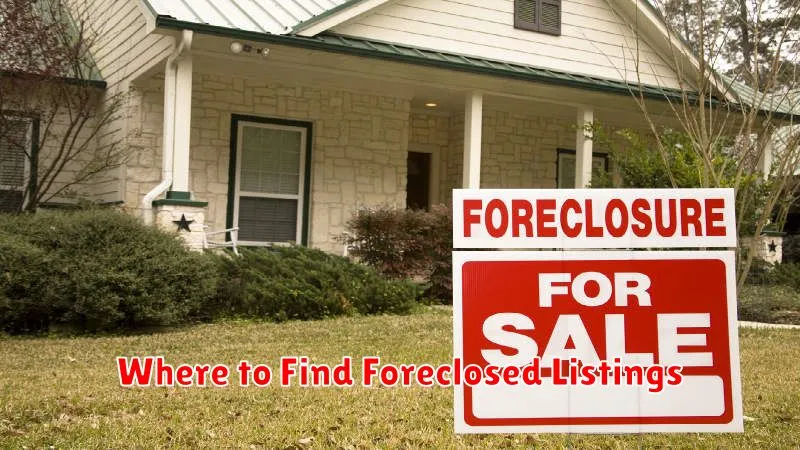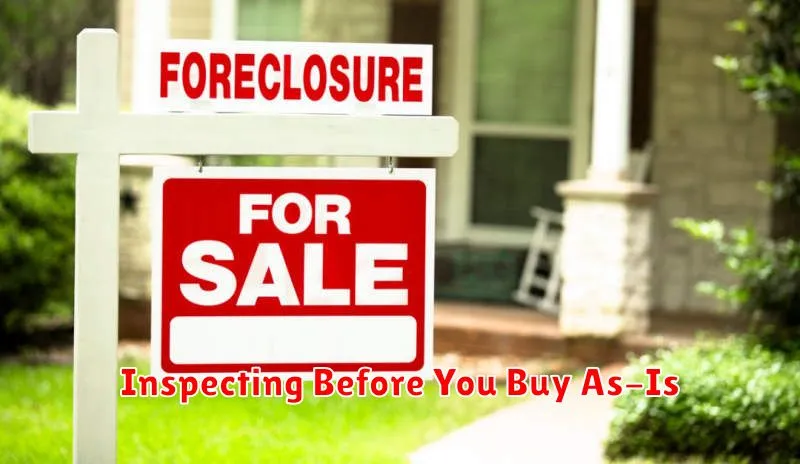Considering purchasing a foreclosed home? Buying a foreclosed property can be an appealing prospect, potentially offering opportunities for below-market-value purchases. However, navigating the process of buying a foreclosure requires careful consideration of several key factors. From understanding the different stages of foreclosure to conducting thorough due diligence and securing financing, there’s a lot to learn before making an offer on a foreclosed property. This article will guide you through the essential information you need to know about buying a foreclosed home, helping you make informed decisions and potentially secure a great deal.
This comprehensive guide will delve into the intricacies of the foreclosure process, outlining the potential benefits and drawbacks of buying a foreclosed home. We’ll explore the different types of foreclosures available, including pre-foreclosures, REO properties (Real Estate Owned), and foreclosure auctions. We’ll also cover crucial topics such as conducting thorough inspections, understanding potential hidden costs, and navigating the complexities of financing a foreclosed home purchase. Whether you’re a seasoned real estate investor or a first-time homebuyer considering a foreclosed home, this article will equip you with the knowledge you need to proceed confidently.
What Is a Foreclosed Property?
A foreclosed property is a real estate property that has been repossessed by a lender—typically a bank—due to the borrower’s failure to make mortgage payments. This process, known as foreclosure, involves the lender taking legal ownership of the property after a period of missed payments. The lender then typically sells the property to recover the outstanding loan balance and any associated costs.
Foreclosure typically begins after a homeowner defaults on their mortgage. Lenders usually attempt to work with borrowers to avoid foreclosure, often offering loan modifications or other solutions. However, if these efforts are unsuccessful, the foreclosure process proceeds. The specific procedures vary by state and jurisdiction but generally involve a legal process that gives the borrower a chance to reinstate the loan or contest the foreclosure. Once the legal requirements are met, the property is sold, often at a public auction.
Individuals can purchase foreclosed properties, often at a price below market value. However, buying a foreclosed property comes with potential risks, including the need for repairs, outstanding liens, or other legal issues. Potential buyers should carefully research the property and its history before making a purchase, ideally with the assistance of a real estate professional and a legal advisor.
Pros and Cons of Buying Foreclosures
Purchasing a foreclosed property can offer significant financial advantages. Often, these properties are listed below market value, presenting an opportunity for substantial savings. This can be particularly appealing to investors looking to flip properties or to first-time homebuyers seeking an affordable entry into the market. However, buying a foreclosure also comes with inherent risks. Foreclosed homes are frequently sold “as-is,” meaning the buyer is responsible for all repairs, regardless of their extent. This can lead to unexpected and potentially costly renovations, negating some of the initial savings. Thorough inspections are crucial to assess the property’s condition and estimate potential repair costs.
The process of buying a foreclosure can also be more complex than a traditional home purchase. Competition can be fierce, often involving multiple bidders and potentially extended closing timelines. Additionally, navigating the legal procedures associated with foreclosures can be challenging, requiring a thorough understanding of local regulations and potentially the assistance of a real estate attorney. Due diligence is essential, including title searches to ensure a clear ownership transfer and avoid potential legal issues down the line.
Ultimately, the decision of whether or not to buy a foreclosure hinges on carefully weighing the potential benefits against the risks. A realistic assessment of your financial resources, risk tolerance, and willingness to undertake repairs is critical. While the potential for significant savings is enticing, it’s imperative to proceed with caution and be fully prepared for the challenges that may arise.
Where to Find Foreclosed Listings

Locating foreclosed properties involves utilizing a variety of resources. Online real estate platforms like Zillow, Realtor.com, and Trulia often feature foreclosure listings, allowing you to search by location and price range. Additionally, government agencies such as the Department of Housing and Urban Development (HUD) and the Federal National Mortgage Association (Fannie Mae) maintain databases of foreclosed properties they own. These websites provide detailed information about the properties, including photos and bidding procedures.
Beyond online resources, consider more traditional methods. Local newspapers and real estate publications frequently advertise foreclosed homes. Working with a real estate agent specializing in foreclosures can significantly streamline the search process. These agents have access to Multiple Listing Services (MLS) and often possess in-depth knowledge of the local market, allowing them to identify suitable properties quickly.
Auction houses are another avenue for finding foreclosure listings. These auctions, often conducted both online and in person, offer the opportunity to purchase properties at potentially discounted prices. However, it’s crucial to conduct thorough due diligence before bidding at an auction, including property inspections and title searches to understand any associated risks.
How the Bidding Process Works

The bidding process is a competitive procedure used to determine the best offer for goods, services, or contracts. It involves potential suppliers or contractors submitting bids, which are formal proposals outlining their offered price and terms. The entity seeking the goods or services, often referred to as the buyer or client, then evaluates these bids based on pre-determined criteria such as price, quality, and experience.
Typically, the bidding process begins with the buyer issuing a request for proposals (RFP) or a similar document. This document details the specific requirements and expectations for the project or product. Interested parties then prepare and submit their bids, ensuring they adhere to the guidelines outlined in the RFP. The buyer carefully reviews each bid and may engage in negotiations or clarifications with potential bidders before making a final decision.
Ultimately, the contract or purchase order is awarded to the bidder who presents the most advantageous offer, considering all relevant factors. This doesn’t always mean the lowest price; factors like quality, delivery time, and past performance play a significant role in the decision-making process. A transparent and well-defined bidding process ensures fairness and promotes competition, ultimately leading to better value for the buyer.
Inspecting Before You Buy As-Is

Purchasing a home “as-is” means the seller won’t make any repairs before closing. It’s crucial to thoroughly inspect the property to understand its current condition and potential future costs. A professional inspection can uncover hidden issues like structural problems, plumbing or electrical defects, and pest infestations. This information empowers you to make an informed decision about whether the asking price justifies the potential repair expenses.
Don’t skip the inspection even if the house seems perfect. Experienced inspectors know where to look for common problems that might not be obvious to the untrained eye. Their detailed report will provide a comprehensive overview of the property’s condition, enabling you to negotiate a fair price or walk away from a potentially costly investment. Consider specialized inspections, such as for pests, radon, or lead paint, depending on the age and location of the home.
While the “as-is” clause limits the seller’s responsibility for repairs, it doesn’t eliminate your right to negotiate. Armed with the inspection report, you can request a lower price to reflect the needed repairs or ask the seller to address specific critical issues before closing. Ultimately, a thorough inspection is your best defense when buying a home “as-is,” protecting you from unexpected and potentially expensive surprises down the road.
Financing a Foreclosed Home Purchase
Buying a foreclosed home can be a great way to get a deal, but financing can be tricky. Foreclosed properties are often sold “as-is,” meaning the lender won’t make repairs. This can affect the types of loans you can qualify for. Conventional loans might be available for foreclosures in good condition, while FHA 203(k) loans are designed for properties requiring rehabilitation. VA loans can also be used to purchase foreclosures, with similar requirements to conventional loans regarding the property’s condition. It’s crucial to get a thorough inspection to understand the potential repair costs and factor them into your budget.
Securing financing requires pre-approval just like any other home purchase. You should be prepared to provide a larger down payment than with a traditional purchase, potentially 20% or more, depending on the loan type and property condition. Lenders view foreclosures as higher risk, so they often require stricter qualification criteria. Having a strong credit score, a stable income, and a low debt-to-income ratio can significantly improve your chances of approval.
The foreclosure purchase process often moves quickly, especially at auctions. Having your financing in place beforehand is essential to make a competitive offer. Be prepared to act fast and have all your financial documentation readily available. Working with a real estate agent experienced in foreclosures can be invaluable during this process. They can help you navigate the complexities and avoid potential pitfalls.
Legal and Title Concerns to Watch
When purchasing real estate, thoroughly investigate legal and title issues to avoid future problems. A clear title confirms rightful ownership and absence of encumbrances like liens or easements that could restrict your use of the property. Title insurance protects against unforeseen title defects discovered after closing. Engage a qualified real estate attorney to review all documents and ensure your interests are protected.
Due diligence is crucial. This includes ordering a title search and examining survey documents. The title search reveals the property’s ownership history, while the survey confirms boundaries and identifies any encroachments. Addressing these concerns upfront can prevent costly disputes later.
Be aware of potential red flags. These might include gaps in the chain of title, unresolved liens, or conflicting easements. Don’t hesitate to ask questions and seek professional advice if anything is unclear. A careful approach to legal and title matters is essential for a secure and successful real estate transaction.

